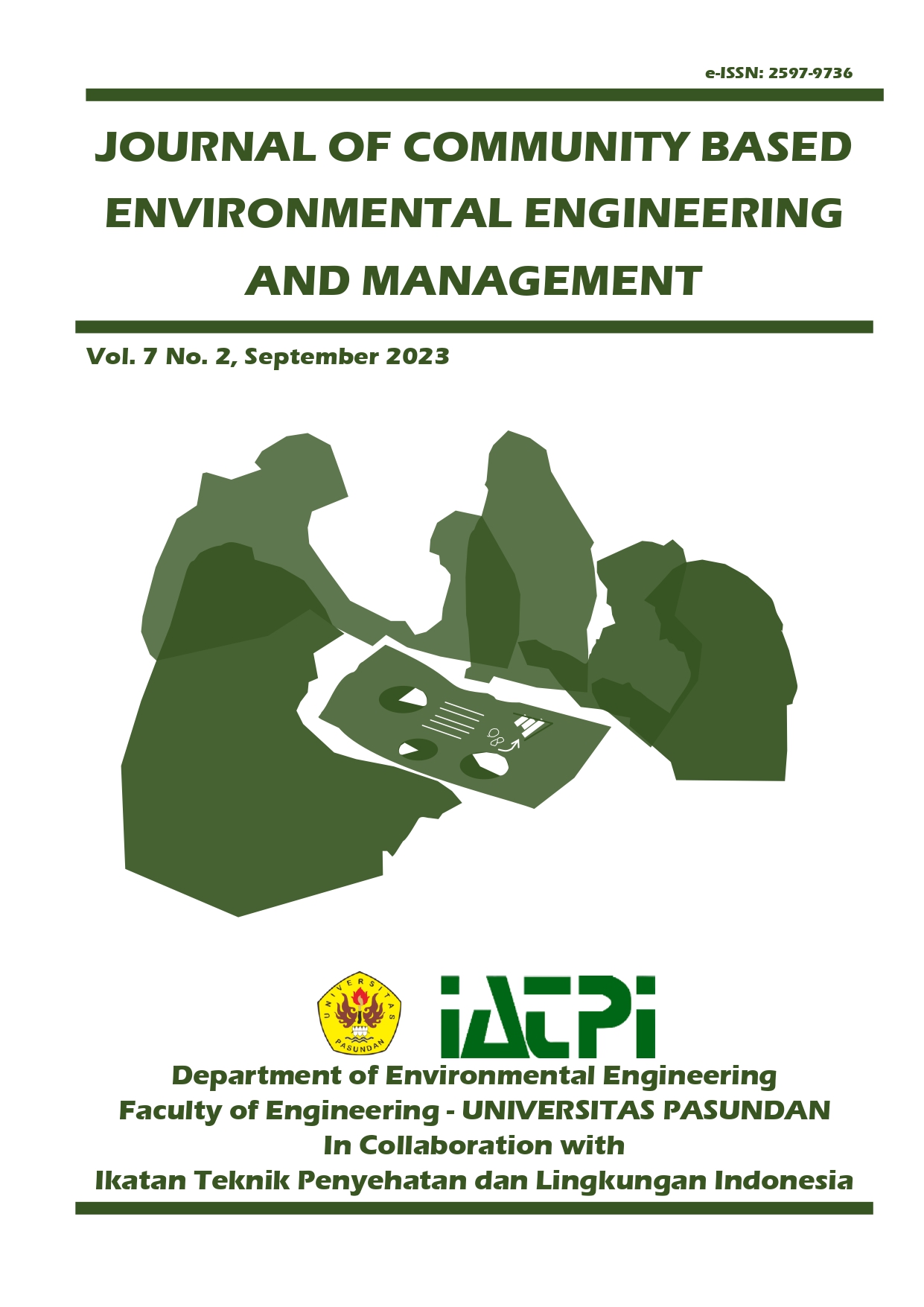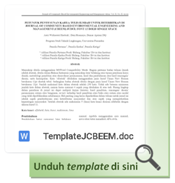Rasch Analysis of Household Waste Reduction Behavior: Case Study in Sunten Jaya, Bandung Barat Regency
DOI:
https://doi.org/10.23969/jcbeem.v7i2.10383Keywords:
household waste management, Rasch Analysis, waste reduction intentionAbstract
The reduction of domestic waste in developing countries is a critical issue that requires attention. Behavioural intentions of households can lead to reduce, reuse and recycle behaviour in waste management. Many factors influence the reduction of waste. Psychological and behavioural characteristics often hinder the effectiveness of technical solutions in managing household waste, so it is important to understand human behaviour to design effective policies. Rural areas also face waste problems, but they do not receive as much attention as urban areas. This research aims to identify the behavioural intentions of households to reduce waste in a small village in Bandung Barat Regency. This study uses Rasch model to measure a person's perspective in an objective way. Data for this study was collected using a questionnaire. The questions were rated on a five-point Likert scale. The number of respondents who participated in this study was 27. The small number of respondents was due to difficulties in finding respondents, as most people were farming at the time of the study. The result shows that the person’s reliability is statistically misfit, whereas the item reliability is fit. The respondent/person misfit may be because the respondents are farmers with a low level of education. The Cronbach's alpha value, which measures the interdependence between the person and the item, is 0.70. Since the item reliability is 0.95 and the person reliability is 0.62, it can be concluded that the quality of the items of the instrument is good, and the consistency of the respondents' answers is also good. Questionnaire item I8 is the most difficult question for respondents to agree with a value of +2.09 logit. On the other hand, the easiest questionnaire item to agree on is I18 with -1.74 logit. From the results it can be concluded that the respondents know about waste separation. However, they never carried out waste separation. It can be inferred that the behaviour of the respondents does not reflect their knowledge.
Downloads
References
Bardus M, Massoud MA. Predicting the Intention to Sort Waste at Home in Rural Communities in Lebanon: An Application of the Theory of Planned Behaviour. (2022). Int J Environ Res Public Health. Jul 31;19(15):9383. doi: 10.3390/ijerph19159383. PMID: 35954744; PMCID: PMC9368497.
Chengqin, E.K., Zailani, S., Rahman, M.K., Aziz, A.A., Bhuiyan, M.A. and Gazi, M.A.I. (2022), "Determinants of household behavioural intention towards reducing, reusing and recycling food waste management", Nankai Business Review International, Vol. ahead-of-print No. ahead-of-print. https://doi.org/10.1108/NBRI-01-2022-0011
Hizuru Nishio and Toshie Takeuchi, (2005), "Factors of Household Recycling and Waste Reduction Behavior", in AP - Asia Pacific Advances in Consumer Research Volume 6, eds. Yong-Uon Ha and Youjae Yi, Duluth, MN, Association for Consumer Research, Pages: 46-51.
Costa A, Mouro C and Duarte AP, (2022), Waste separation—Who cares? Organizational climate and supervisor support’s role in promoting pro-environmental behaviors in the workplace. Front. Psychol. 13:1082155. doi: 10.3389/fpsyg.2022.1082155
Kannan Govindan, Yue Zhuang, Gang Chen, (2022), Analysis of factors influencing residents' waste sorting behavior: A case study of Shanghai, Journal of Cleaner Production, Volume 349, 131126, ISSN 0959-6526,
https://doi.org/10.1016/j.jclepro.2022.131126.
Mouloudj, K.; Njoku, A.; Asanza, D.M.; Bouarar, A.C.; Evans, M.A.; Mouloudj, S.; Bouarar, A. Modeling Predictors of Medication, (2023), Waste Reduction Intention in Algeria: Extending the Theory of Planned Behavior. Int. J. Environ. Res. Public Health, 20, 6584. https:// doi.org/10.3390/ijerph20166584
Nik Masdek, N.R., Wong, K.S.K., Mohd Nawi, N., Sharifuddin, J. and Wong, W.L. (2023). Antecedents of Sustainable Food Waste Management: Empirical evidence from urban households in Malaysia. Management & Marketing, Vol. 18, No. 1, pp. 53-77, DOI: 10.2478/mmcks-2023-0004.
Rachman, I., Yustiani, Y.M., Raharjo, S., Matsumoto, T., (2016). Analysis on the Appropriate model of community-based management (Case of rural area in Karang Joang Village, Balikpapan, Indonesia). International Journal of Waste Resources, 6(4): 34-38. DOI: 10.4172/2252-5211.1000258
Rasch Modelimg, https://www.publichealth.columbia.edu/research/population-health-methods/rasch-modeling
Schoeman DC, Rampedi IT. Drivers of Household Recycling Behavior in the City of Johannesburg, South Africa. (2022). Int J Environ Res Public Health. May 20;19(10):6229. doi: 10.3390/ijerph19106229. PMID: 35627763; PMCID: PMC9141565.
Shanyong Wang, Jinpeng Wang, Shu Yang, Jun Li, Kaile Zhou, (2020), From intention to behavior: Comprehending residents’ waste sorting intention and behavior formation process, Waste Management, Volume 113, Pages 41-50, ISSN 0956-053X, https://doi.org/10.1016/j.wasman.2020.05.031.
Sih, Damayanti., Tri, Rakhmawati. (2023). Household food waste reduction intention: A conceptual framework. Nucleation and Atmospheric Aerosols, doi: 10.1063/5.0106003
Sumintono, B., & Widhiarso, W. (2014). Aplikasi Model Rasch untuk Penelitian ilmu-ilmu Sosial (Revisi Nov). TRIM Komunikata Publishing House.
Taylor, S., & Todd, P. (1995). Understanding Household Garbage Reduction Behavior: A Test of an Integrated Model. Journal of Public Policy & Marketing, 14(2), 192–204. http://www.jstor.org/stable/30000128
Whitmarsh LE, Haggar P and Thomas M (2018) Waste Reduction Behaviors at Home, at Work, and on Holiday: What Influences Behavioral Consistency Across Contexts? Front. Psychol. 9:2447. doi: 10.3389/fpsyg.2018.02447
Yustiani, Y.M., Rochaeni, A., Aulia, E. (2019). Konsep Pengelolaan Sampah di Desa Babakan Kabupaten Bandung. EnviroScienteae, 15(1): 121-126. DOI: 10.20527/es.v15i1.6332
Yustiani, Y.M., Abror, D. (2019). Operasional Bank Sampah Unit dalam Pengelolaan Sampah Perkotaan. Jurnal Lingkungan dan Sumberdaya Alam (JURNALIS), 2(2): 82-89
Zaikova, Anna, Ivan Deviatkin, Jouni Havukainen, Mika Horttanainen, Thomas Fruergaard Astrup, Minna Saunila, and Ari Happonen. (2022). "Factors Influencing Household Waste Separation Behavior: Cases of Russia and Finland" Recycling 7, no. 4: 52. https://doi.org/10.3390/recycling7040052
Zhe, Liu., Zhe, Liu., Michelle, Adams., Tony, R., Walker. (2018). Are exports of recyclables from developed to developing countries waste pollution transfer or part of the global circular economy. Resources Conservation and Recycling. doi: 10.1016/J.RESCONREC.2018.04.005
Zhiyong, Han., Yong, Liu., Min, Zhong., Guozhong, Shi., Qibin, Li., Dan, Zeng., Yu, Zhang., Fei, Yongqiang., Yanhua, Xie. (2018). Influencing factors of domestic waste characteristics in rural areas of developing countries. Waste Management. doi: 10.1016/J.WASMAN.2017.11.039














